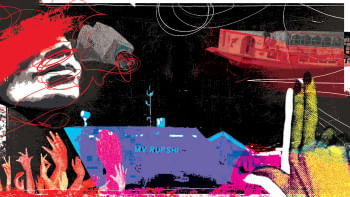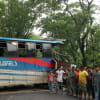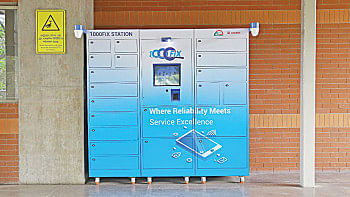Sunken ferry brings forth winter travel concerns

With the country shrouded in freezing fog, there is no denying that visibility has become a safety concern for the transport sector. The past few days saw reports about how flight operations were disrupted, ferry services suspended, and road vehicles derailed or collided because of reduced visibility caused by the dense fog. On Wednesday morning, a utility ferry carrying nine goods-laden trucks and minitrucks sank near the Paturia terminal in Manikganj. Although there have been conflicting claims about its reason—with some officials citing a collision with a bulk carrier while some survivors pointing to water seepage amid a nighttime travel embargo—it is evident that fog played a role during or in the lead up to the incident.
There have been no reported casualties after the capsize, with all aboard safety rescued. But that's more due to luck—with the ferry carrying only trucks and no general passengers—than any preventive measure. The fact is, despite fog-related incidents being a common occurrence, every winter comes with renewed fears about travel safety both on waterways and roads. Often water vessels are not fitted with proper fog lights, while their use on roads poses both legal and operational complications. Experts also blame lack of trained crew members, insufficient safety checks, rise in river traffic (including unregistered vessels), and poor regulatory oversight for the rising waterway tragedies. All these just heighten the risk of accidents during winter.
Even during air travel, safety is far from assured. Just how vulnerable to accidents or disruptions it is can be understood from the fact that the Civil Aviation Authority of Bangladesh (CAAB) recently shut down a system meant to protect planes from winter fog right in the middle of winter. Reportedly, the Instrument Landing System—which makes it possible for planes to land in low visibility—has been disabled in a bid to upgrade it. The current system allows landing with a visibility of 800 metres or more, but once upgraded, it will allow landing when visibility is as low as 500 metres. While upgradation is important, the timing is not just illogical but can be dangerous. Just the other day, we saw how an Indian plane made an emergency landing in Dhaka because of low visibility.
We, therefore, urge the authorities to ensure maximum preparation to prevent fog-related incidents. Since low visibility may continue to be an issue for several days more, all relevant departments must be on alert.

 For all latest news, follow The Daily Star's Google News channel.
For all latest news, follow The Daily Star's Google News channel. 








Comments